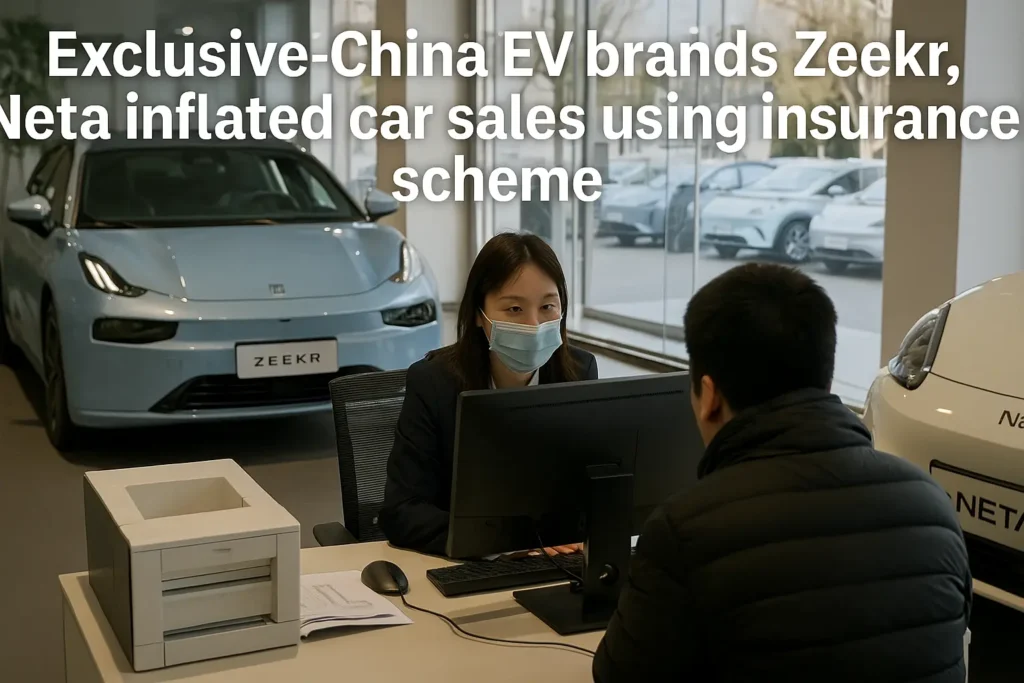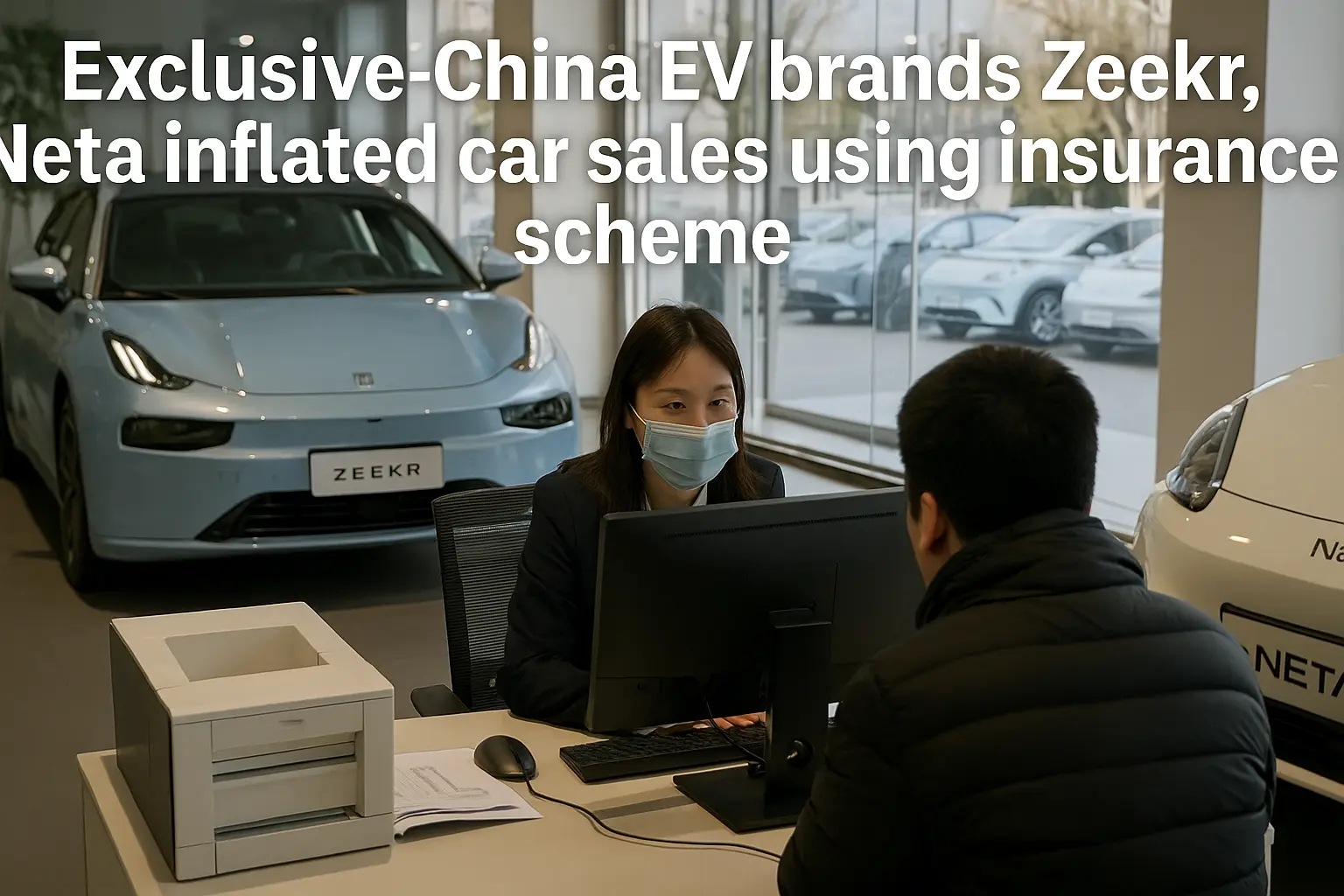China EV brands Zeekr and Neta reportedly inflated car sales using an insurance scheme to fake delivery numbers. Discover how this scandal impacts investors, global markets, and the future of EV transparency.
🚘 Shocking Scheme in the EV World Raises Global Red Flags
In a revelation that could shake investor confidence and draw global regulatory scrutiny, two of China’s fastest-growing electric vehicle (EV) makers—Zeekr and Neta—have been accused of inflating their car sales using a deceptive insurance-based scheme.
According to sources and internal documentation obtained exclusively by investigative reporters, both automakers allegedly pumped up their monthly sales figures by registering unsold vehicles using fake or manipulated insurance data, creating the illusion of stronger consumer demand than actually existed.
This sales-inflation scandal is raising serious concerns among global automakers, EV investors, and international policymakers. The allegations also highlight broader risks in China’s red-hot EV sector—a market that is poised to dominate the future of mobility but still lacks certain regulatory guardrails.
⚠️ The Alleged Insurance-Based Sales Fraud: How It Worked
Sources familiar with the matter described a system in which dealers or connected third parties took out vehicle insurance policies under fake customer names or “shadow buyers”—even though those vehicles never actually left the dealership or reached real owners.
By doing this, Zeekr and Neta were able to record the vehicles as “sold” in monthly sales reports, giving the impression of rising consumer demand, market traction, and production momentum.
This inflated the brands’ reported monthly delivery numbers, which are closely watched by:
- Investors evaluating EV stocks
- Global automakers looking to gauge Chinese competition
- Government bodies that base subsidies and policy support on sales figures
In reality, many of these so-called sales never resulted in actual delivery or ownership. According to insiders, some of the insured vehicles were later de-registered or quietly returned to inventory, undermining the integrity of the sales data.
📊 Why It Matters: The Stakes Are High for EV Markets
This news hits at a critical moment.
China is already the world’s largest EV market, and its brands—like BYD, Zeekr (a Geely brand), and Neta (under Hozon Auto)—are rapidly expanding into Europe, Southeast Asia, and even Latin America.
In recent years, Chinese EV makers have boasted explosive growth, capturing global headlines and investor attention. But if that growth is being propped up by accounting gimmicks and manipulated sales, the global EV narrative could shift dramatically.
American investors, U.S. automakers like Tesla, Ford, and GM, and regulatory bodies such as the SEC will likely keep a close eye on the fallout.
🏭 Who Are Zeekr and Neta?
To understand the gravity of this scandal, let’s take a quick look at the two companies involved.
🔹 Zeekr
- A premium EV brand under Geely, one of China’s largest automakers
- Competes directly with Tesla in the high-end segment
- Recently announced plans to expand into Europe and the Middle East
- Raised billions through private funding rounds and has IPO ambitions
🔹 Neta
- Operated by Hozon Auto, focused on affordable EVs for younger buyers
- Gained popularity in China’s second- and third-tier cities
- Has plans to expand globally, especially into Southeast Asia
- Known for rapid production growth and flashy marketing campaigns
Both companies are backed by major funding and government incentives, making them poster children of China’s EV dream.
📈 Market Reactions: Skepticism Grows
Once the allegations surfaced, both Zeekr and Neta saw increased skepticism from industry analysts and global media.
While neither company has publicly confirmed the use of insurance-based sales inflation, industry insiders suggest the practice may have been more widespread than reported.
In fact, some observers say this may not be an isolated incident, but rather a systemic issue in parts of China’s auto market, especially among smaller or fast-growing EV brands chasing government targets and investor milestones.
🧾 Sales Numbers That Didn’t Add Up
According to leaked registration data:
- A significant portion of Neta’s reported sales in late 2023 and early 2024 were not corroborated by actual license plate issuance or road usage
- Several Zeekr units that were listed as “sold” remained stored in off-site lots, with no customer pickup activity for months
- Internal dealership memos even referenced “insurance activation as sales tool” in dealer training sessions
This suggests a coordinated effort rather than rogue dealer behavior.

💰 Why Inflate Sales in the First Place?
There are a few key motives that may explain why automakers might inflate their numbers:
1. To Secure More Funding
Investors—especially in pre-IPO rounds—are attracted to rapid growth. Inflated sales give the illusion of market dominance and justify higher valuations.
2. To Qualify for Government Subsidies
China’s government provides financial incentives and subsidies to EV makers based on volume. Inflated numbers could help companies unlock millions in state aid.
3. To Outshine Competition
In a hyper-competitive EV market, being seen as a “leader” brings media buzz, partner interest, and dealership expansion.
📉 Risk for Global Investors and Partners
For U.S. investors who have bought into Chinese EV stocks, or for American automakers looking to partner with these brands, this scandal represents a cautionary tale.
Due diligence is essential, especially in emerging markets where:
- Transparency may be limited
- Auditing standards may differ
- Regulatory enforcement may lag
Several U.S.-based EV funds and analysts are already re-evaluating their positions in Chinese EV firms following these revelations.
🌐 International Implications
This case could ripple beyond China.
✅ For U.S. Auto Companies:
American EV brands like Tesla and Rivian could leverage this credibility gap to reinforce trust with consumers and investors. Quality and transparency may become key marketing tools.
✅ For Policymakers:
Governments in the U.S. and Europe may demand greater oversight and auditing requirements from any Chinese EV brands looking to enter their markets.
✅ For Trade Relations:
This case may fuel existing trade tensions between the U.S., EU, and China, particularly around concerns of subsidized exports and data transparency.
🛑 What Zeekr and Neta Are Saying
Both companies have issued vague denials.
- Zeekr stated that their “sales figures are accurate and based on standard reporting methods,” while declining to comment on the insurance issue.
- Neta said they “take compliance seriously,” but offered no detailed explanation of the alleged discrepancies.
Neither company has announced an internal investigation or committed to auditing their past sales reports. This lack of transparency has only deepened investor concerns.
🧠 Expert Reactions
“This is the kind of manipulation we feared when China’s EV boom began,” said one U.S.-based EV market analyst.
“It shows the dangers of unverified growth stories in opaque markets.”
“If these companies want to succeed in Western markets, they’ll need to play by stricter rules—and fast,” said a former SEC compliance officer.
“This won’t just affect Zeekr and Neta—it could impact perception of the entire Chinese EV industry,” warned an auto industry think tank.
🔍 What to Watch Next
Stay tuned for:
- Official investigations or audits—especially if the Chinese government steps in
- IPO delays or funding freezes for Zeekr or Neta
- More whistleblowers or leaks about other EV makers
- Regulatory changes affecting Chinese EV exports
🔚 Final Thoughts
While EVs remain the future of transportation, this scandal is a stark reminder that not all growth is real, and not all players follow the rules.
For American consumers, investors, and policymakers, the takeaway is clear:
✅ Trust is earned—not claimed.
✅ Transparency is not optional in a global market.
✅ The EV revolution must be built on integrity, not inflated numbers.
As the world transitions to electric, stories like this will shape who leads—and who gets left behind.

Must Read
Fed’s Goolsbee: New Tariff Announcements May Delay Rate Cuts
